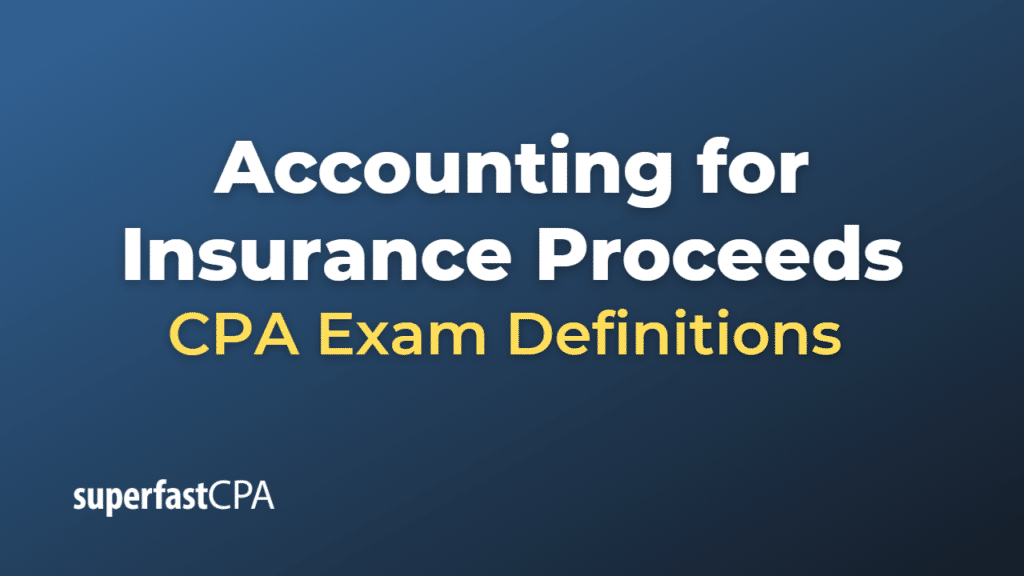Accounting for Insurance Proceeds
Accounting for insurance proceeds involves recognizing and recording the financial impact of insurance claim settlements received by a company as a result of a covered event, such as property damage, loss, theft, or business interruption. The proper accounting treatment for insurance proceeds depends on the nature of the event and the type of insurance coverage.
Here are the key steps to account for insurance proceeds:
- Assess the event: Determine whether the event is covered by the company’s insurance policy and if the company is entitled to receive insurance proceeds.
- File a claim: Submit a claim to the insurance company, providing necessary documentation and evidence to support the claim.
- Determine the accounting treatment: The accounting treatment for insurance proceeds depends on the nature of the event and the type of insurance coverage. In general, insurance proceeds are recognized as income or as a reduction of an expense or loss, depending on the circumstances. The following are common scenarios:a. Reimbursement for a loss: If the insurance proceeds are intended to reimburse the company for a loss or damage (e.g., property damage, theft, or loss of inventory), the proceeds are typically recorded as a reduction of the related loss or expense. This could involve crediting the asset account or the loss account, depending on the specific circumstances.b. Business interruption: If the insurance proceeds are intended to compensate for lost profits due to business interruption, the proceeds are typically recognized as other income in the income statement.c. Liability coverage: If the insurance proceeds are related to a liability coverage, the proceeds are recorded as a reduction of the related liability.
- Record the journal entry: Once the insurance company approves the claim and the company receives the proceeds, record the appropriate journal entry to reflect the receipt of the insurance proceeds.
Example of Accounting for Insurance Proceeds
Let’s consider an example of a company accounting for insurance proceeds related to a theft of inventory.
Example: XYZ Corporation experiences a theft at its warehouse, resulting in a loss of inventory worth $40,000. The company has insurance coverage for theft and submits a claim to the insurance company. The insurance company approves the claim and issues a payment of $35,000 to XYZ Corporation, as the policy has a $5,000 deductible.
Here’s how XYZ Corporation would account for the insurance proceeds:
Step 1:
Assess the event: XYZ Corporation confirms that the theft is covered by its insurance policy and is entitled to receive insurance proceeds.
Step 2:
File a claim: The company submits a claim to the insurance company, providing necessary documentation and evidence to support the claim.
Step 3:
Determine the accounting treatment: Since the insurance proceeds are intended to reimburse XYZ Corporation for the loss of inventory, the proceeds will be recorded as a reduction of the related loss.
Step 4:
Record the journal entry: XYZ Corporation records the following journal entries to reflect the theft of inventory and the receipt of insurance proceeds:
a. Record the inventory loss:
| Debit: Loss on Theft of Inventory | $40,000 |
| Credit: Inventory | $40,000 |
b. Record the receipt of insurance proceeds:
| Debit: Cast (or Insurance Receivable) | $35,000 |
| Credit: Loss on Theft of Inventory | $35,000 |
After recording these entries, the net impact on XYZ Corporation’s income statement is a $5,000 loss (the policy deductible), reflecting the fact that the company was partially reimbursed by the insurance company for the loss of inventory.
By properly accounting for the insurance proceeds, XYZ Corporation ensures that its financial statements accurately reflect the financial impact of the insured event and the compensation received from the insurance company.













